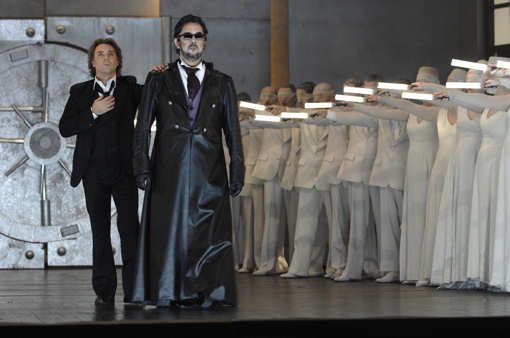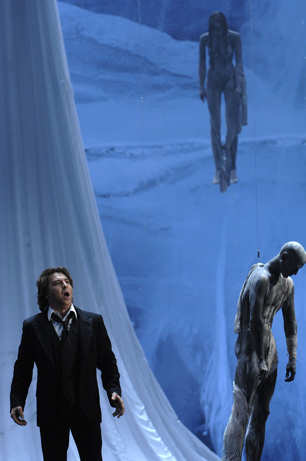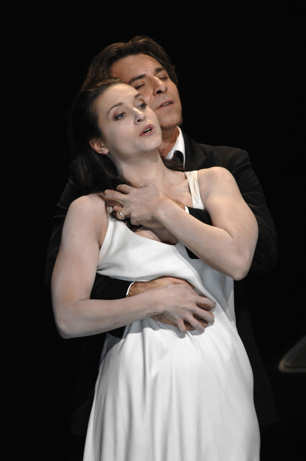Other Links
Editorial Board
- Editor - Bill Kenny
- London Editor-Melanie Eskenazi
- Founder - Len Mullenger
Google Site Search
SEEN
AND HEARD INTERNATIONAL OPERA REVIEW
Gluck, Orphée et Eurydice:
(new production, David Alagna stage director) Soloists, chorus,
orchestra of the Opéra National de Montpellier, Marco Guidarini
(conductor) Montpellier, France. 3. 2.2008 (MM)
When a production of Gluck's Orphée et Eurydice is
announced you usually take no notice of who is singing Orphée
because you probably have never heard of him anyway. But such was
not the case in Montpellier when one did notice because you had
heard of him. With disbelief you saw it was Roberto Alagna, though
the idea soon became explicable, remembering that Maria Callas had
once sung the Liebestod - so why not Roberto Alagna
singing Che faro senza Euridice (J'ai perdu non Eurydice)?
These mysteries were quickly explained. Gluck's Orphée et
Eurydice had been de-constructed by director David Alagna
(Roberto's brother) in light of the latent high drama and deep
intelligence in this Gluck masterpiece. He had given free rein to
his own obviously formidable theatrical imagination, and was
taking full advantage of the vocal and histrionic resources of his
tenorissimo brother. David (dah-veed) is hardly the first
director to plumb the depths of Gluck's masterpiece and will not
be the last. But this Orphée et Eurydice, while made from
the Gluck Orphée, is anything but Gluck's opera, nor
something that Gluck himself could possibly have imagined:
except perhaps for the Romeo et Juliette ending imposed on
it by David Alagna, an ending that Gluck would surely have
preferred to the conventional happy one.
Amor, baritone Marc Barrard in a floor length black leather cloak,
gave Orphée his options. The long black hearse brought Orphée to
heaven's waiting room, a rather crowded worldly mortuary for souls
in transition. Knowing about stratospheric travel, contemporary
audiences understand that temperatures are frigid in the heavens,
and so Guidarini's Mahlerian trombones sounded their chilling
tones, bringing into sight a corps de ballet of suspended
frozen bodies. That of Eurydice identified, the long black hearse
arrived to bring her back to earth, not without the well-known
discussion passionately voiced by the beautiful Serena Gamberoni.
Furious with Orphée, she first made love with the tall and
handsome Amor in the hearse's front seat.

Equally absurd was the idea that Marco Guidarini was conducting -
the Genovese conductor who had made even the reticence of
Pelléas et Méisande eloquently alive in Nice, who had fired
its suppressed love triangle into a passionate eruption. Hardly
the man to illuminate this signature, cool musical document of the
French Enlightenment, calming the excessive grief of the Baroque
within the intimate confines of the Rococo.
The Montpellier season itself seemed peculiar, programming first
the famous Offenbach parody of the Orpheus myth last December
before stating the myth itself two months later in the
pristine form (one presumed) that Gluck had imposed upon it in his
most famous reform opera.

Once past David Alagna's mute prologue - an interpolated
first scene of a noisy wedding party that rudely punctuated
Gluck's translocated incidental music - the second scene, now
Gluck's own, unfolded with skillful paramedics pulling first the
lifeless body of Eurydice from an overturned, crushed bright red
Renault, followed by the inanimate body of her husband Orphée.
There was no longer any possibility that this was not a parody, a
fully and clearly defined made-for-television-movie reality opera
supplanting opera's most hallowed pastoral myth. And then the cry
"Eurydice" from the world-class Verdi tenor with some of the
biggest vocal coglioni (balls) around, in full evidence.
Any further fears of the banal were banished right along with all
collegium musicum regrets.
Alagna lamented at Eurydice's tomb, supported by her grief
stricken parents, surrounded by a sea of umbrella covered friends,
the cellos of Guidarini's full blown orchestra throbbing sobs, the
crushed red Renault replaced by a long black hearse. Overcome,
Orphée fell into the pile of dirt about to cover Eurydice's
coffin, his face and chest against the stage floor that now became
a massive sounding board for his, and Gluck's, magnificent
Chiamo il mio ben cosi (Eurydice, Eurydice, ombre chère).

The grief of the Alagnas' Orphée was real, was wrenching, and
was fully considered in the finest Gluckian manner, but no longer
with his formidable eighteenth century emotional discipline. This
new Alagna perspective was a forging of the considerable art of
twentieth century operatic hyper-verismo with twenty-first
century conceptual art, realized with the considerable resources
of one of France's finest opera companies. Roberto Alagna is a
phenomenon. Equally as much an artist as he is a tenor, he gave full
realization to these often contradictory terms in this performance,
putting the heated vocal posturing of the heroic tenor to the
service of cool, smart conceptual art.
Among the triumphs of the evening were the visually stunning stage
pictures created by director/designer David Alagna, with
costumes from Carla Teti. But most remarkable of all was the cool
control exercised by Alagna's direction, never forcing his staging
beyond the boundaries determined by Gluck's reformist intentions
and the immense wit of his own vision. He proved himself a true
artist, with this Orphée et Eurydice held always within
this delicate balance
Marco Guidarini, the Alagnas' willing musical collaborator,
brought an exploration of color and a musical urgency to Gluck's
score that added new luster to France's centuries old tradition of
orchestral art. It cannot be left unsaid that the flute solo in
the blessed spirits ballet music has never been played more
beautifully.
The Montpellier Orphée ritual completed, the excited
cast took their bows and the wildly enthused audience showered the
stage with flowers. Finally, (and only finally) did Roberto bring
his brother David onto the stage for a bow to a chorus of boos.
Michael Milenski
Pictures ©
Luc
Jennepin / Opéra National de Montpellier
Back
to Top
Cumulative Index Page
